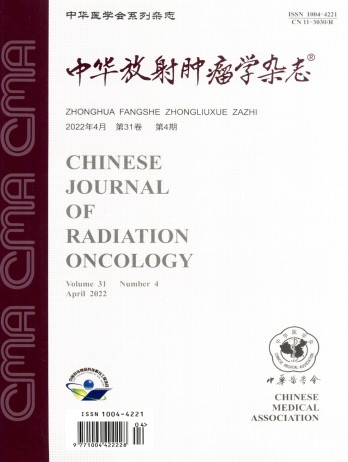SIOPE指南在儿童颅骨脊髓照射靶点确定中的临床应用
引用次数: 0
摘要
目的根据SIOPE(2018)指南,对颅脑脊髓照射患者的全脑靶区进行划定,并对原计划未划定的亚结构进行欠剂量验证,旨在为颅脑脊髓照射的全脑复发风险提供证据,为SIOPE指南的临床应用积累经验。方法选择12例行颅脊髓放射治疗的儿童。根据2018年SIOPE指南,在原CTVold(全脑+筛板)的基础上圈定CTVold(包括眶上裂、圆孔、卵圆孔、颈静脉孔、舌下管、内听道和视神经),形成PTVnew。一个粗糙的PTV (PTVrough)通过向前向下(颅底)给出15mm的边缘,在其他方向上给出3mm的边缘形成。CRTold和IMRTold方案是基于PTVold设计的。基于PTVnew设计了CRTnew和IMRTnew方案。基于PTVrough设计了cr槽方案。评估了各方案中基于CTVold的子结构遗漏情况和CTVsub的剂量不足情况。结果CTVold共漏诊78.6%的眶上裂、71.99%的圆孔、96.76%的卵圆孔、88.5%的颈静脉孔、97.71%的舌下管、99.48%的内听道和100%的视神经容积。基于CRTold和IMRTold的CTVsub靶剂量覆盖率分别仅为91.70%和89.83%。CRTold、CRTnew、IMRTold、IMRTnew和cr槽方案的亚结构分别出现16.66%、3.57%、20.83%、1.78%和1.19%的剂量不足。在所有亚结构的剂量不足中,CRTold和IMRTold计划分别占38.36%和46.58%。其中,圆形孔(0%)和卵圆孔(36.66%)的剂量不足程度最小、最显著。结论根据SIOPE指南,传统的脑组织描绘(包括筛板)在颅脊髓照射的颅靶定义中可能会遗漏部分靶。最显著的剂量不足发生在卵圆孔,在IMRT计划中更为明显。基于子结构圈定的方案可以显著改善欠剂量。当采用AP-PA照射时,建议采用粗略的PTV,以获得近似的靶剂量覆盖范围和风险保留器官,但需要进一步的临床验证。关键词:SIOPE指南;Craniospinal照射;目标的定义;次级架构本文章由计算机程序翻译,如有差异,请以英文原文为准。
Clinical application of SIOPE guidelines in target definition for craniospinal irradiation in children
Objective
According to the SIOPE (2018) guidelines, the whole brain target of patients undergoing craniospinal irradiation was delineated and the underdose of sub-structures which were not delineated in original plan was verified, aiming to provide evidence for the risk of whole brain recurrence of craniospinal irradiation and accumulate experience for the clinical application of SIOPE guidelines.
Methods
Twelve children who underwent craniospinal irradiation were selected. As per the SIOPE guidelines in 2018, the CTVsub (including the superior orbital fissure, foramen rotundum, foramen ovale, jugular foramen, hypoglossal canal, internal auditory meatus and optic nerve) were delineated based on the original CTVold (whole brain plus sieve plate) to form PTVnew. A rough PTV (PTVrough) was formed by giving a margin of 15 mm forward-downward (skull base) and 3 mm in the other directions. CRTold and IMRTold plans were designed based on PTVold. CRTnew and IMRTnew plans were designed based on PTVnew. CRTrough plan was designed based on PTVrough. The omission of sub-structures based on CTVold and the underdose of CTVsub in each plan were evaluated.
Results
A total of 78.6% of superior orbital fissure, 71.99% of foramen rotundum, 96.76% of foramen ovale, 88.5% of jugular foramen, 97.71% of hypoglossal canal, 99.48% of internal auditory meatus and 100% of optic nerve volume were missed based on CTVold. The target dose coverage of CTVsub based on CRTold and IMRTold was only 91.70% and 89.83%, respectively. The underdose was observed in 16.66%, 3.57%, 20.83%, 1.78% and 1.19% of sub-structures in CRTold, CRTnew, IMRTold, IMRTnew and CRTrough plans, respectively. Of the underdose of all sub-structures, 38.36% and 46.58% occurred in CRTold and IMRTold plans, respectively. Among them, the least and the most significant underdose occurred in foramen rotundum (0%) and foramen ovale (36.66%), respectively.
Conclusions
As per the SIOPE guidelines, traditional brain tissue delineation (including sieve plate) is likely to omit part of the target during the cranial target definition of craniospinal irradiation. The most significant underdose occurs in foramen ovale, and more obvious in the IMRT plan. The plan based on the delineation of sub-structures can significantly improve the underdose. When AP-PA irradiation is adopted, a rough PTV is recommended to obtain approximate target dose coverage and organ of risk sparing, whereas it requires further clinical verification.
Key words:
SIOPE guideline; Craniospinal irradiation; Target definition; Sub-structures
求助全文
通过发布文献求助,成功后即可免费获取论文全文。
去求助
来源期刊
自引率
0.00%
发文量
6375
期刊介绍:
The Chinese Journal of Radiation Oncology is a national academic journal sponsored by the Chinese Medical Association. It was founded in 1992 and the title was written by Chen Minzhang, the former Minister of Health. Its predecessor was the Chinese Journal of Radiation Oncology, which was founded in 1987. The journal is an authoritative journal in the field of radiation oncology in my country. It focuses on clinical tumor radiotherapy, tumor radiation physics, tumor radiation biology, and thermal therapy. Its main readers are middle and senior clinical doctors and scientific researchers. It is now a monthly journal with a large 16-page format and 80 pages of text. For many years, it has adhered to the principle of combining theory with practice and combining improvement with popularization. It now has columns such as monographs, head and neck tumors (monographs), chest tumors (monographs), abdominal tumors (monographs), physics, technology, biology (monographs), reviews, and investigations and research.

 求助内容:
求助内容: 应助结果提醒方式:
应助结果提醒方式:


